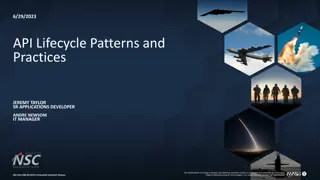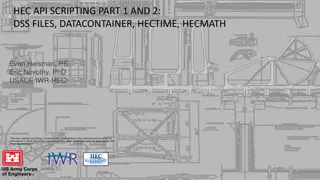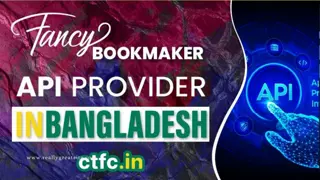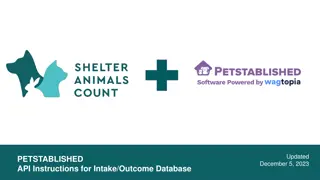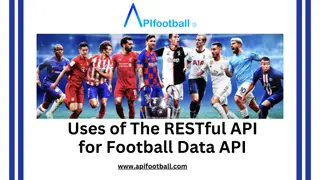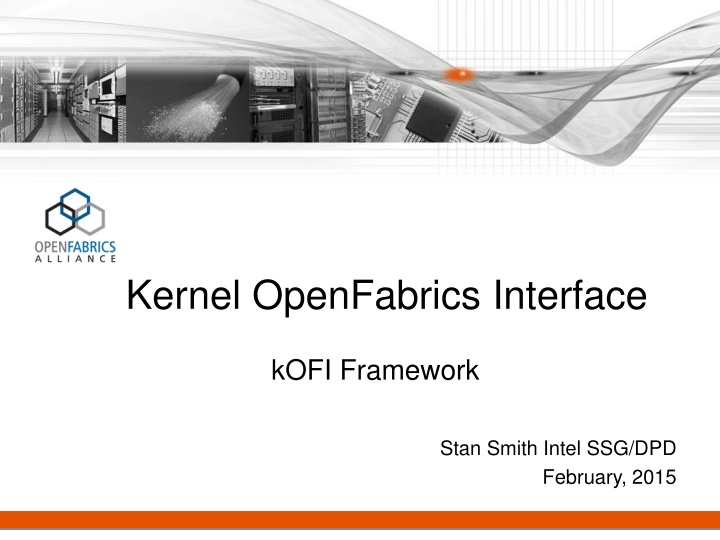
Understanding Kernel OpenFabrics Interface Framework and APIs
Discover the Kernel OpenFabrics Interface (kOFI) framework designed by Stan Smith of Intel SSG/DPD in February 2015. Learn about the structure of kOFI APIs, including control interfaces and communication interfaces, and how applications interact with these components for efficient data transfers and communication with remote endpoints.
Download Presentation

Please find below an Image/Link to download the presentation.
The content on the website is provided AS IS for your information and personal use only. It may not be sold, licensed, or shared on other websites without obtaining consent from the author. If you encounter any issues during the download, it is possible that the publisher has removed the file from their server.
You are allowed to download the files provided on this website for personal or commercial use, subject to the condition that they are used lawfully. All files are the property of their respective owners.
The content on the website is provided AS IS for your information and personal use only. It may not be sold, licensed, or shared on other websites without obtaining consent from the author.
E N D
Presentation Transcript
Kernel OpenFabrics Interface kOFI Framework Stan Smith Intel SSG/DPD February, 2015
kOFI Framework kOFI API kOFI API kOFI Providers RDS Provider IBverbs Provider New Providers kSocket kernel IBverbs RDS Device Drivers Ethernet iWarp InfiniBand RoCE New Devices * Red indicates new kernel components
kOFI API kOFI interfaces are designed such that they are cohesive and not simply a union of disjoint interfaces. The interfaces are logically divided into two groups: control interfaces are a common set of operations that provide access to local communication resources. communication interfaces expose particular models of communication and fabric functionality, such as message queues, remote memory access, and atomic operations. Communication operations are associated with fabric endpoints. Kofi applications will typically use the control interfaces to discover local capabilities and allocate necessary resources. They will then allocate and configure a communication endpoint to send and receive data, or perform other types of data transfers, with remote endpoints. 3 www.openfabrics.org
kOFI API kOFI API exports up fi_getinfo() fi_fabric() fi_domain() fi_endpoint() fi_cq_open() fi_ep_bind() fi_listen() fi_accept() fi_connect() fi_send() fi_recv() fi_read() fi_write() fi_cq_read() fi_cq_sread() fi_eq_read() fi_eq_sread() fi_close() KOFI API (extremely thin code layer) kOFI API exports down kofi_provider_register() During kofi provider module load a call to kofi_provider_register() supplies the kofi-api with a dispatch vector for fi_* calls. kofi_provider_deregister() During kofi provider module unload/cleanup kofi_provider_deregister() destroys the fi_* runtime linkage for the specific provider (ref counted). 4
kOFI Application Flow Initialization Server connection setup (if required) Client connection setup (if required) Connection finalization (if required) Data transfer Shutdown www.openfabrics.org 5
kOFI Initialization fi_getinfo( &fi ) Acquire a list of desirable/available fabric providers. Select appropriate fabric (traverse provider list). fi_fabric(fi, &fabric) Create a fabric instance based on fabric provider selection. fi_domain(fabric, fi, &domain) create a fabric access domain object. 6 www.openfabrics.org
kOFI End Point setup fi_ep_open( domain, fi, &ep ) create a communications endpoint. fi_cq_open( domain, attr, &CQ ) create/open a Completion Queue. fi_ep_bind( ep, CQ, send/recv ) bind the CQ to an endpoint fi_enable( ep ) Enable end-point operation (e.g. QP- >RTS). 7 www.openfabrics.org
kOFI connection components fi_listen() listen for a connection request fi_bind() bind fabric address to an endpoint fi_accept() accept a connection request fi_connect() post an endpoint connection request fi_eq_sread() blocking read for connection events. fi_eq_error() retrieve connection error information 8 www.openfabrics.org
kOFI Reliable Datagram transfer fi_sendto() post a Reliable Datagram send request fi_recvfrom() post a Reliable Datagram receive request. fi_cq_sread() synchronous/blocking read CQ event(s). fi_cq_read() non-blocking read CQ event(s). fi_cq_error() retrieve data transfer error information fi_close() close any kofi created object. www.openfabrics.org 9
kOFI message data transfer fi_mr_reg( domain, &mr ) register a memory region fi_close( mr ) release a registered memory region fi_send( ep, buf, len, fi_mr_desc(mr), ctx ) post async send from memory request. fi_recv( ep, buf, len, fi_mr_desc(mr), ctx ) post async read into memory request. fi_sendmsg() post send using fi_msg (iovec + imm data). fi_readmsg() post read using fi_msg (iovec + imm data). 10 www.openfabrics.org
kOFI RDMA data transfer fi_write() post RDMA write. fi_read() post RDMA read. fi_writemsg() post RDMA write msg (iovec). fi_readmsg() post RDMA read msg (iovec). 11 www.openfabrics.org
kOFI message data transfer fi_send() post send. fi_recv() post read. fi_sendmsg() post write msg (iovec + imData). fi_recvmsg() post read msg (iovec+ imData). fi_recvv(), fi_sendv() post recv/send with iovec. 12 www.openfabrics.org
KOFI Provider kofi_provider_register (uint version, struct kofi_provider *provider) kofi_provider_deregister (struct kofi_provider *provider) struct kofi_provider { const char *name; uint32_t version; int (*getinfo)(uint32_t version, const char *node, const int service, uint64_t flags, struct fi_info *hints, struct fi_info **info); int (*freeinfo)(struct fi_info *info); int (*fabric)(struct fi_fabric_attr *attr, struct fid_fabric **fabric, void *context); }; www.openfabrics.org 14



